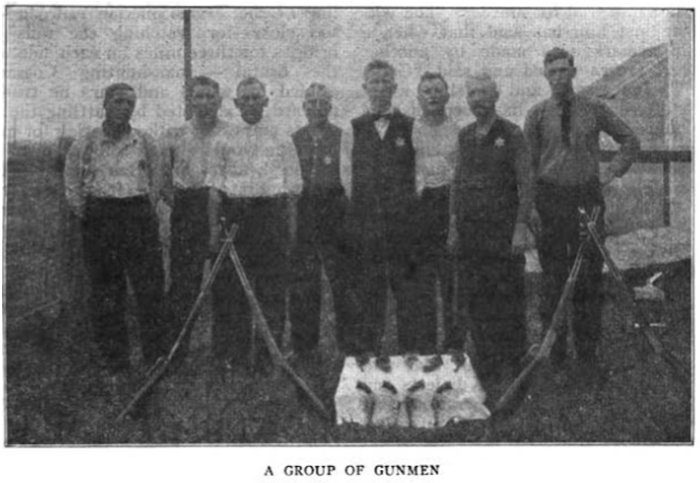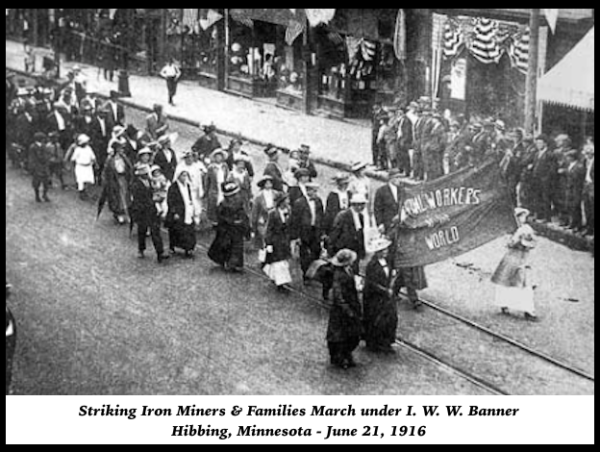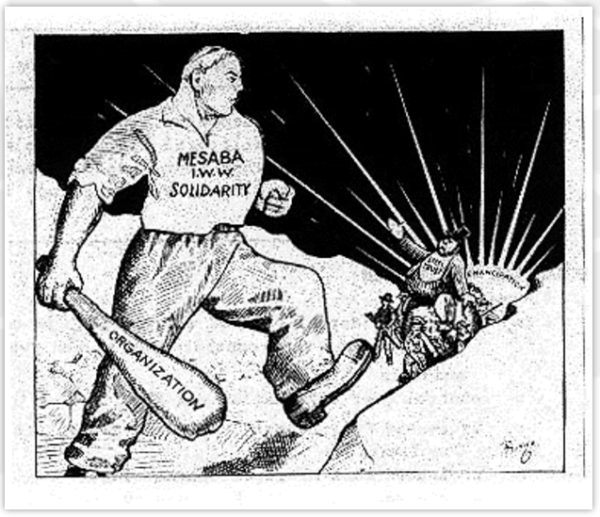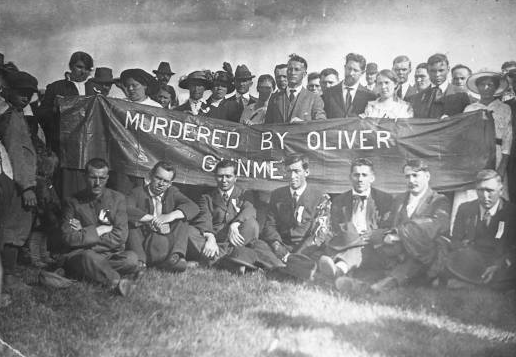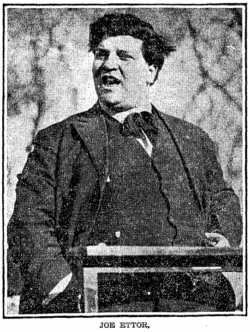You ought to be out raising hell.
This is the fighting age.
Put on your fighting clothes.
-Mother Jones
Hellraisers Journal, Friday February 2, 1917
St. Paul, Minnesota – House Labor Committee Holds Hearings
If the Minnesota State Senate thought that the House would quickly join them in the passage of the so-called “I. W. W. Riot Fund,” they were sadly mistaken. The bill has been tabled for now, and the House Labor committee is in the process of holding hearings into conditions up on the Mesabi Iron Range and in the logging camps of northern Minnesota.
From The Minneapolis Morning Tribune of January 30, 1917:
ACITON DEFEREED ON I. W. W. RIOT FUND
—–
The House appropriations committee at its meeting last night deferred a recommendation on the so-called $50,000 I. W. W. appropriation annually for a period of two years to employ deputy sheriffs for the suppression of labor troubles in northern Minnesota, pending action of the labor committee.
———-
[Photograph added.]
From The Minneapolis Morning Tribune of January 27, 1917:
House Indorses Plan for
I. W. W. Inquiry
—–
Resolution Authorizes Probe of Disturbances
in Northern Minnesota.
—–
The House of Representatives yesterday authorized an inquiry into I. W. W. disturbances.
After several days’ discussion, members of the Senate committee on general legislation recently decided that such an inquiry would be futile.
Representative W. D. Washburn of Minneapolis was responsible for the inquiry resolution yesterday. As adopted, the resolution provides for an investigation to be conducted by the labor committee.
The House committees on appropriations and labor now have under consideration the bill passed by the Senate appropriating $50,000 for use by the governor in paying deputy sheriffs.
Northern Minnesota representatives said last night that the inquiry would only serve to delay the passage of the bill.
Representative A. O. Devold of Minneapolis objected to the investigation. T. J. McGrath of St. Paul, one of the labor leaders in the House, argued for the investigation.
———-
[Photograph added.]
From The Brainerd Daily Dispatch of January 29, 1917:
A LEGISLATIVE INQUIRY JAN. 30
—–
Believed that I. W. W. Activities
in Mines and Lumber Camps
of State to be Probed
—–
WITNESSES SUMMONED TODAY
—–
Sergeant at Arms C. W. Nelson
was in Brainerd and on the
Cuyuna Iron Range
What is believed to be the first work of the kind ever undertaken by a sergeant-at-arms of the Minnesota legislature was the summoning of witnesses to appear before the committee on labor and labor legislation in St. Paul January 30 at 2 P. M. to give evidence believed to be in Industrial Workers of the World matters.
Sergeant-at-arms C. W. Nelson, of St. Paul, summoned Sheriff Claus A. Theorin, of Brainerd, Capt. G. A. Anderson of the Rogers-Brown Ore Co. of Crosby, Walter Jacobson and Chief of Police C. A. Lewis of Crosby also Sheriff Andrew Johnson of Bemidji, Beltrami county and some 15 or 20 from the Mesaba range.
It is believed I. W. W. activities as evidenced at the miners strikes on the Cuyuna and Mesaba iron ranges, and trouble in the logging camps and sawmills of the northern part of the state will be investigated.
Representative Hilding A. Swanson of Brainerd, is a member of the legislative committee on labor and labor legislation which has the investigation in hand.
—–
[Photograph added.]
From The Minneapolis Morning Tribune of January 30, 1917:
Many Witnesses on Hand to
Testify in I. W. W. Inquiry
—–House Committee to Begin Hearings on
Labor Troubles in North Woods.
—–
WASHBURN EXPLAINS PURPOSE OF INQUIRY
—–
Meantime, Bill Giving Governor $50,000
Yearly to Police State Is Held Up.
—–
An extensive inquiry into the I. W. W. troubles in the north woods will be begun today by the Labor committee of the Minnesota House of Representatives.
Sheriffs and their deputies, police officials from Duluth, logging company employes and farmers will be on hand to testify.
The House appropriations committee last night voted to reconsider the bill passed by the Senate which appropriates $100,000 to be used by the governor in the next two years in quelling similar disturbances. The bill was then laid on the table pending the outcome of the inquiry to be conducted by the labor committee.
The Labor committee originally had before it the subject matter of the Senate bill. Under a resolution introduced by W. D. Washburn of Minneapolis, the committee was authorized to conduct and extensive investigation.
Purpose of Inquiry Explained.
Mr. Washburn last night issued the following statement, as a reply to criticisms voiced because of his action:
The purpose of the resolution is to investigate conditions in northern Minnesota, is to secure information upon which some legislation may be secured to settle permanently the troubles that have afflicted the northern part of the state for the last year. It is introduced solely to get the facts in the case, without the slightest prejudice to labor or capital or any citizen concerned.
Much annoyance has been expressed that this appropriation of $50,000 was not immediately passed. It must be apparent, however, to all the people of northern Minnesota that an appropriation to secure deputies by the Governor does not improve this situation in the slightest particular, but on the contrary is likely to lead to permanent and wide-spread trouble.
According to our constitution, the powers to protect life and property are ample in every part of the state. If the local communities are unable or unwilling to enforce their own law, they can then call upon the sheriff, who has every power that is necessary.
Peril to Local Government Seen.
The thoughtful citizen of northern Minnesota should consider whether this ample power which is present in every county in the state should be abandoned in favor of a law which takes away local self-government and gives the Governor of the state power to send deputies to any county to enforce the law which should be enforced by the citizens.
Now, law abiding citizens in every town can be required to serve as deputies to protect life and property and they would undoubtedly be glad to serve in this connection if called upon. The sending of non-resident deputies to northern Minnesota can only be followed by turmoil and confusion and the loss of life and property. Surely the residents of northern Minnesota, and especially the residents of the great county of St. Louis, which has the largest taxable property in the state, do not want to establish a precedent which is going to impair the theory of local self-government.
———-
[Emphasis and photograph added.]
From The Minneapolis Morning Tribune of January 31, 1917:
I. W. W. Agitators Make Appearance
in Front of Legislators
—–Joe Ettor and George Andreytchine
Conduct Propaganda Before
House Committee.
—–
“BUM PAY, BUM WORK,” DECLARES ONE WITNESS
—–
Object Is to Kill Bill, Appropriating
Funds for Deputy Sheriffs.
—–
Industrial Workers of the World invaded new fields yesterday. They made their appearance in the halls of the Minnesota Legislature and held forth just as they might have done in a strike gathering.
Joe Ettor, leader of many strikes, known from Lawrence, Mass., to Seattle, was there. So was George Andreytchine, editor of a Bulgarian newspaper of Chicago, recently arrested on charges of inciting riot and the central figure in deportation proceedings. It was whispered that “Big Bill” Haywood might even come up and get in the limelight.
Had Audience.
The I. W. W. propagandists had just as much of an audience as they might have had in some mining town where a strike was in progress. The only difference was in the character of audience. In this instance, lawmakers-senators and representatives-made up the listeners.
The occasion for the appearance of the so-called “organizers” was the first hearing by the House labor committee in its inquiry into labor conditions in northern Minnesota-The bill appropriating $100,000 for two years to be used in paying deputy sheriffs to quell disturbances, indorsed by Governor Burnquist, was under discussion.
Jumps to Feet.
At one point in the proceeding “Joe” Ettor jumped to his feet and charged that the committee was “stacked” and that there did not appear to be any sympathy for the I. W. W. He asked for the privilege of examination of witnesses.
For a time the members of the Labor committee occupied the center of the stage. They made speeches concerning procedure and finally permitted the examination Ettor desired.
Thorne First Witness.
A. W. Thorne, I. W. W. organizer, was the first witness. He blamed the sheriffs in Northern Minnesota for violence.
“Bum pay, bum work,” explained the witness when questioned regarding one of the passages in the book of instructions given to new members of the I. W. W. “When wages are inadequate, we perform our work accordingly,” he said.
Slonin Makes Argument.
S. M. Slonin [Slonim] of Duluth, an attorney for I. W. W. made a lengthy argument reciting conditions as he had found them.
The House chamber was packed with spectators during the afternoon and evening. Many I. W. W. sympathizers were present to voice their approval of points made by their leaders who were testifying.
The hearing will continue tonight, if the House has completed its work on the prohibition bill.
———-
[Photograph added.]
SOURCES
The Minneapolis Morning Tribune
(Minneapolis, Minnesota)
-Jan 27, 1917
https://www.newspapers.com/image/181488819/
-Jan 30, 1917
https://www.newspapers.com/image/181489219/
-Jan 31, 1917
https://www.newspapers.com/image/181489284/
The Brainerd Daily Dispatch
(Brainerd, Minnesota)
-Jan 29, 1917
https://www.newspapers.com/image/86098735/
IMAGES
MN16 Gunthugs on the Mesabi, ISR Jan 1917
https://books.google.com/books/reader?id=SVRIAAAAYAAJ&printsec=frontcover&output=reader&source=gbs_atb&pg=GBS.PA429
Minnesota Iron Miners Strike, Hibbing w IWW Banner, June 21, 1916
http://local.sltrib.com/charts/joehill/gallery/activism.html
“Somebody Has Got to Get Out of The Way”
Solidarity, Mesabi IWW Club, by R Chaplin (Bingo), Aug 19, 1916
http://www.iww.org/pt/node/2556
John Alar Funeral, Banner, Virginia MN, June 26, 1916
http://ironrange.cdmhost.com/cdm/singleitem/collection/p4002coll1/id/1400/rec/4
Joe Ettor Speaks in Boston for Joe Hill, Globe, Nov 8, 1915
http://newspaperarchive.com/us/massachusetts/boston/boston-daily-globe/1915/11-08/page-28
See also:
Hellraisers Journal: Minnesota Senate Passes Anti-IWW Bill; Is Expected to Pass State House of Representatives
https://weneverforget.org/hellraisers-journal-minnesota-senate-passes-anti-iww-bill-is-expected-to-pass-state-house-of-representatives/
Hellraisers Journal: Rebellion in Lumber Camps of Northern Minnesota: Harrison George Reports
https://weneverforget.org/hellraisers-journal-rebellion-in-lumber-camps-of-northern-minnesota-harrison-george-reports/
Sadly, I have not been able to find this source online:
Minnesota House of Representatives,
Committee of Labor and Labor Legislation, Hearings,
“Labor Troubles in Northern Minnesota, January 30, 1917”
-in John Lind Papers, Minnesota Historical Society
http://www2.mnhs.org/library/findaids/00304.xml
The Industrial Workers of the World, 1905-1917
-by Philip S Foner
International Publishers, 1994 (my copy is 1980)
(search with: “Labor Troubles” (choose 594) & search again with “red strike handbill”)
https://books.google.com/books?id=qGPtAAAAMAAJ
According to Foner, within the Labor Com’s Report can be found a “red strike handbill” which lists the demands presented by IWW strike committee to the Rainy Lumber Co:
The mill men demanded a wage raise of 25 cents, abolition of the Sunday night shift, an eight-hour day for Sunday day work, change of the day and night shift each week, and no discrimination against union men. The lumberjacks presented ten demands calling for a wage increase, reduction in hours, better conditions in the camps, no hospital fee, and again no discrimination against union men. The leaflet closed: “It is understood that the sawmill workers and lumberjacks are fighting together for these demands, and that neither the sawmill workers or the lumberjacks will go back to work until the demands of both the sawmill workers and the lumberjacks are recognized.”
Note: for research on name Slonin/Slonim, see Hellraisers Journal of Feb 5, 1917.

